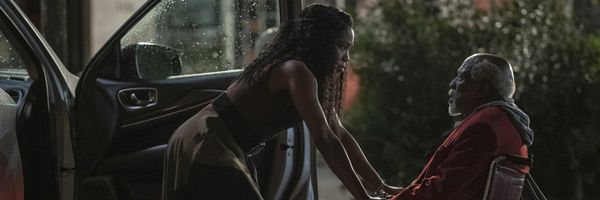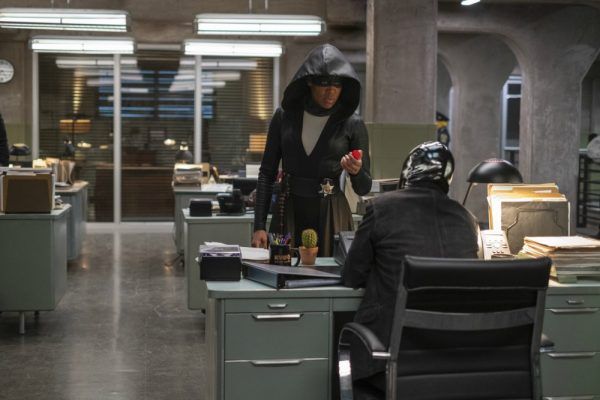HBO’s Watchmen sure is spinning a lot of plates at the moment. What the heck are Lady Trieu and Angela’s grandfather up to? What is the Seventh Kavalry planning to do with those portals? Who put Adrian Veidt on a moon of Jupiter and why? And how did a 100-year-old man kill Judd Crawford? We’ve got four episodes left to sort that out, but in its fifth installment, “Little Fear of Lightning,” Watchmen decidedly started tipping in the direction of answering questions.
We finally found out for sure that Adrian Veidt is being kept as a prisoner in space. We confirmed those suspicions that sketchy Senator Keene is working with the 7K. Oh, and there was a giant effing squid. At last. But “Little Fear of Lightning” also finally gave us some answers about those mysterious red pills Angela’s been toting around.
The Looking Glass-centric episode followed Tim Blake Nelson’s officer to his ex-wife's (disturbing as hell) cloning office in search of answers, where she informed him that the drug is called “Nostalgia” and it’s extremely dangerous. “They outlawed those, because it turns out putting memories in pill form leads to psychosis,” she said in a brief but effective bit of expository dialogue. That doesn’t sound good for Angela, who chugged a bottle of her grandfather’s Nostalgia before getting carted away to a jail cell at the end of the episode.
If you want a bit more detail than memory pills make you crazy, fortunately, Watchmen’s companion site Peteypedia released an old pamphlet for the medication-turned-illegal substance dated back in 2007. “The present is a worrisome time because the future is unknown. That leaves only the past to comfort us,” it reads before delivering some bullet point details on the drug, and some fascinating hints at what’s to come for Angela in the fine print.
The pamphlet reveals that Nostalgia was a “revolutionary, all-natural personally customized medication for people suffering from anxiety, dementia, and psychic trauma” created by TRIEU How does it work? “Nostalgia turns memories of your choice into easily digestible tablets that will allow you to experience those memories in the most lucid way possible.”
It continues, “Nostalgia is a customized psychoactive compound composed of synthetic mnemonic material replicated from the patient’s brain and all-natural corticosteroids drawn from the patient or properly matched blood relative. Tablets are derived through a proprietary process of neurochemical scanning of the hippocampus.” So Trieu scans your brain and uploads your memory into a pill that’s designed specifically for your DNA. The pamphlet also notes that each tablet can hold 1-5 memories, and the pills are coded by color with red pills representing the “most insense”. Now, I’m no math genius and I’m not sure exactly how many pills Angela took, but I’m gonna estimate she just consumed a buttload of memories in the most intense form.
Even while it was legal, taking nostalgia required a doctor’s prescription, a psychological assessment, and a signed legal waiver. The details in the safety information note that the length of the experience can vary and in bold “Never take someone else’s Nostalgia”
Which means Angela is in for a real shitshow of an experience, because also listed in the fine print are the following potential effects of overdosing on Nostalgia: “cardiac arrest; respiratory distress; sleeping sickness; catatonia’ psychic looping’ incessant weeping, laughing, or screaming; random or irregular erections; random or irregular vaginal wetness; involuntary orgasms; explosive flatulence or diarrhea’ kidney, liver, and colon failure; and the complete collapse of the auto-immune system.”
We'll see exactly what happens when you OD on someone else's red Nostalgia pills in Episode 6, and from the looks of the trailer, Angel's taking a fully immersive trip back to some devastating life events. But we're also going to learn more about what those pills stand for and how the theme of toxic nostalgia ties into the framework of the show.
Watchmen series creator Damon Lindelof explained to Collider that the pills may start out as a MacGuffin, but they’re also a key thematic element:
The pills are a major MacGuffin sort of introduced in Episode 4, we learn a little bit more about their true nature in Episode 5 and we see what happens when you take them in Episode 6. There’s a little bit of Alice in Wonderland here, a little bit of going through the looking glass. When we figure out what they are, that’s is one of the central themes of not just this season of Watchmen, but of Watchmen writ large.
Indeed, the name Nostalgia will be familiar to fans of the comics -- it's the same branding that Adrien Veidt was using to sell his perfume before he launched his Millenium line. It all comes back to that pamphlet promise: “The present is a worrisome time because the future is unknown. That leaves only the past to comfort us," Or as Veidt explained in a letter, when times are tough, “the natural response is to retreat and withdraw from reality.”
Before Watchmen even started airing, Lindelof was speaking openly about the role toxic nostalgia plays in the construct of the show and Watchmen's comic book history (it's no coincidence that a bottle of Nostalgia by Veidt crashes to the ground during Laurie's big confrontation with Doctor Manhattan on Mars.) Speaking with Rolling Stone back in September, Lindelof explained:
Another idea that really captivated me thematically about this season of television is the idea of nostalgia. Nostalgia is a perfume that Adrian Veidt is basically selling at the time of the original Watchmen, as he is preparing to move into his new scent, Millennium. This is something that’s kind of cribbed from Midnight in Paris: The moral of that movie is that every generation feels like the generation before theirs was the generation they wanted to live in. He wants to hang out with Hemingway, and Hemingway wishes he was there for the Moulin Rouge. I think nostalgia is dangerous. It’s toxic. I don’t want to get political, but this idea of, “Let’s travel back to the past,” particularly when you look at that idea through the construct of race and racial inequality in our country, that is bad. I see malevolence in Norman Rockwell paintings, and I wanted to talk about that, too.
We'll see how toxic Nostalgia can get, literally and figuratively in next week's episode which promises to answer a whole lot more questions and take us on a very unfiltered first-person tour of America's dark past.
For more on this week's wild Watchmen episode, be sure to check out what Lindelof had to tell us about that squid scene 30+ years in the making.



